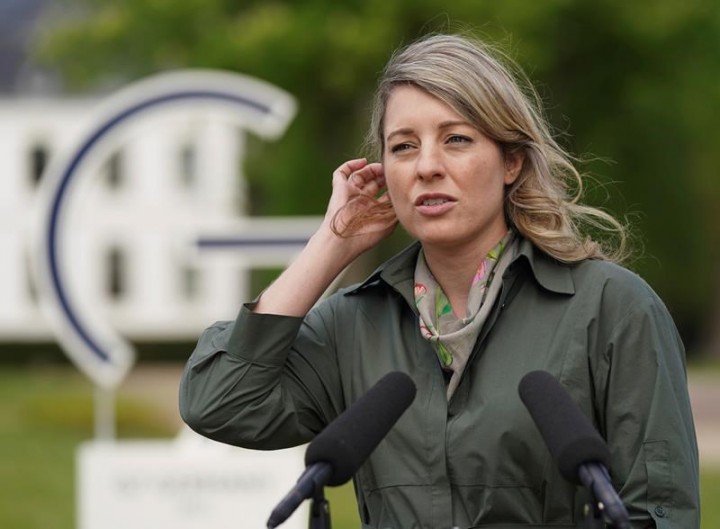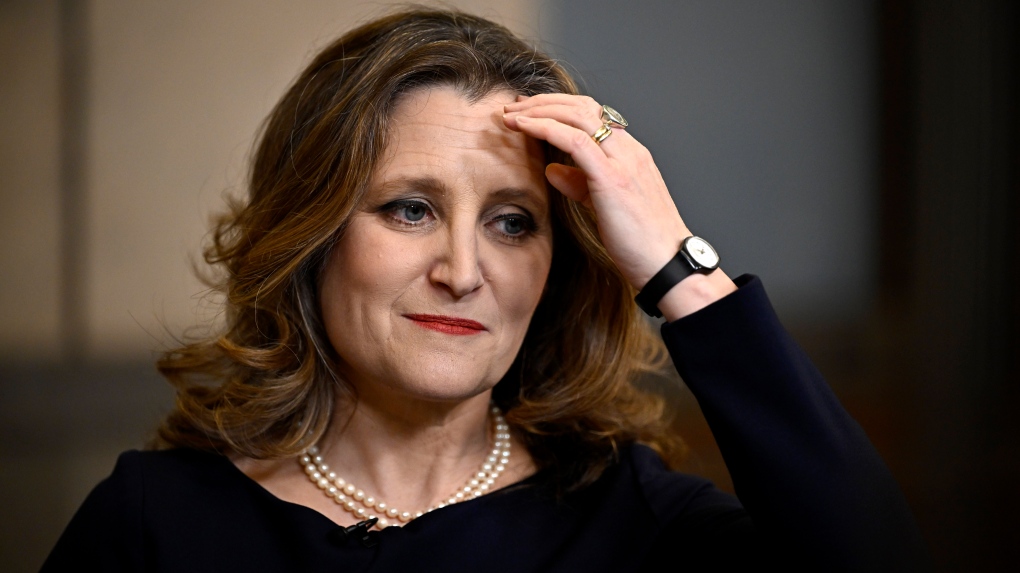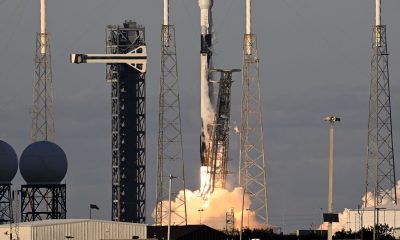News
Joly heads to UN to mobilize action on food crisis sparked by invasion of Ukraine

|
|
OTTAWA — Foreign Affairs Minister Mélanie Joly kicked off two days of meetings Wednesday at the United Nations to help mobilize a global response to the food security crisis resulting from Russia’s invasion of Ukraine.
Joly met with UN Secretary-General Antonio Guterres and Rosemary DiCarlo, the undersecretary-general for political and peacebuilding affairs, before taking part in a ministerial “call to action” on the growing problem of food insecurity around the world.
The meeting, convened by U.S. Secretary of State Antony Blinken, was dominated by the escalating humanitarian crisis triggered by Russian President Vladimir Putin’s invasion, which is about to enter its 13th week.
Prior to the start of the war in late February, the number of people around the world facing a crippling food crisis reached more than 161 million people in 2021, up from 108 million in 2016, Blinken said in his introductory remarks.
The World Bank has estimated the invasion could well drive an additional 40 million more people around the planet into extreme poverty, he added.
“Every driver of the crisis that we’ll discuss today has been made worse by President Putin’s war of choice,” Blinken said. “It’s a crisis that demands a global response.”
Russia has blockaded Ukraine’s ports, stopping exports of wheat and sunflower oil to countries that rely on them in the Middle East, Asia and Africa.
“Canada’s approach will be bold: from providing funding at the multilateral level to logistical supply chain support to food inspectors and cargo shipments, we will get involved,” Joly told her fellow delegates.
“We will free Ukrainian grains, and countries will receive their shipments. To the secretary-general, of course, we will support his efforts to find peaceful and lasting solutions to get those grains out.”
Canada will be sending cargo ships to ports in Romania and other European countries neighbouring Ukraine to help it export its wheat — what Joly described in her speech Wednesday as “freedom wheat.”
The UN World Food Program has warned that the conflict has not only driven up the price of grain, making it more expensive to feed the hungry, but could push nations that rely on Ukrainian wheat toward starvation.
Ukraine is one of the world’s biggest exporters of wheat, with some countries, including Lebanon and Bangladesh, relying on it as a staple food.
“Let me be very clear and to the point: failure to open the ports will be a declaration of war on global food security, resulting in famine, destabilization of nations, as well as mass migration by necessity,” said David Beasley, the former South Carolina governor who now serves as the program’s executive director.
“This is not just about Ukraine. This is about the poorest of the poor around the world who are on the brink of starvation as we speak. So I ask President Putin, if you have any heart at all, to please open these ports.”
Julie Marshall, Canadian spokeswoman for the World Food Program, said Ukraine produces enough to feed about 400 million people around the world. But millions of tons of wheat, much of it bound for developing nations, is sitting in silos and stranded on ships because of the conflict.
Ukraine’s ambassador to Canada, Yulia Kovaliv, told a committee of MPs that not only is Russia blockading Ukraine’s ports, it is stealing its grain stores and attempting to ship them to Russian-held Crimea.
Agriculture Minister Marie-Claude Bibeau has warned that the Russians are also targeting farm machinery and equipment needed to gather and distribute Ukraine’s harvest.
Canada is one of the world’s biggest wheat exporters and has said it will do what it can to help with the shortfall. But Bibeau has said that Canada and the U.S. had a weak harvest last year because of a drought so stocks of grain are lower than usual.
“Our farmers are in the field; planting season has started,” Joly said, describing herself as the granddaughter of a wheat grower and miller. “Let’s hope Mother Nature is on our side.”
She acknowledged that Canada — one of the world’s largest producers of potash, a key ingredient in fertilizer that is also in short supply — has not imposed sanctions on Russian and Belarusian exports the same way that other G7 countries have done.
The government is working on ways to get its own potash to ports around the world, Joly said, and will “chart a path for a long-lasting solution” to the question of sanctions.
On Thursday, Joly will take part in an open debate at the UN Security Council, which the U.S. currently heads, on the links between conflict and food security.
During that debate, Joly will “highlight the need to find long-term solutions to break the cycle of poverty, hunger, and conflict, and to increase resilience, especially in the least-developed countries,” Global Affairs Canada said in a release.
This report by The Canadian Press was first published May 18, 2022.
Marie Woolf, The Canadian Press
News
Federal budget 2024 disliked by half of Canada: poll
|
|


OTTAWA –
A new poll suggests the Liberals have not won over voters with their latest budget, though there is broad support for their plan to build millions of homes.
Just shy of half the respondents to Leger’s latest survey said they had a negative opinion of the federal budget, which was presented last Tuesday.
Only 21 per cent said they had a positive opinion, and one-third of respondents said they didn’t know or preferred not to answer.
Still, 65 per cent of those surveyed said the plan to spend $8.5 billion on housing, aimed at building 3.9 million homes by 2031, is good for the country.
Leger’s poll of 1,522 Canadians last weekend can’t be assigned a margin of error because online surveys are not considered truly random samples.
People in Alberta were most likely to say they had a very negative impression of the budget, with 42 per cent selecting that option compared to 25 per cent across the entire country.
More than half of the people who took the poll said they are in favour of the government’s plans to spend more on energy efficiency, national defence and student-loan forgiveness for health care and education workers.
And 56 per cent said they think the increase to the capital gains tax inclusion rate — a move that’s estimated to raise another $19.4 billion in revenue over the next four years — is a good thing.
The Liberals are billing the change as critical to their plan to improve generational fairness by taxing the ultra-rich.
It has drawn criticism, including from the Canadian Medical Association, which warned on Tuesday that it could affect the country’s ability to recruit and keep physicians.
The budget proposes to make two-thirds of capital gains — the profit made on the sale of assets — taxable, rather than half. For individuals, this would apply to profits above $250,000, but there is no lower threshold for corporations.
The medical association said many doctors will face higher taxes because they have incorporated their practices and used those companies to save for retirement.
While the Liberals are aiming changes to the capital gains tax at younger Canadians including millennials and gen-Zers, Leger’s poll found it had the support of 60 per cent of respondents over the age of 55 — the highest among any age group.
People between 18 and 35 were least likely to support the Liberal plan to spend another $73 billion on defence in the next two decades. Just 45 per cent of respondents in that age group said ramping up defence spending is good for the country, compared with 70 per cent of people over the age of 55.
Leger also asked questions about the country’s fiscal future.
Almost half the respondents, 47 per cent, said they want to see the government cut back on spending and programs to get the budget balanced as quickly as possible.
Just 16 per cent said spending more and running large deficits is the best plan for the next five years, and 14 per cent want to see the government increase taxes to bring the deficit down.




News
Provincial audit turns up more than 40 medical clinics advertising membership fees
|
|
Alberta’s health ministry says an audit has determined that more than 40 medical clinics in the province are advertising membership fees for services, nearly a year after one such plan landed a Calgary clinic in hot water.
The audit was launched last December. In July, CBC News reported that a medical clinic in Calgary’s Marda Loop district was moving to a membership system and planned to charge $4,800 a year for a two-parent family membership, covering two adults and their dependent children.
The next day, Health Canada said the arrangement at the Marda Loop Medical Clinic equated to patients purchasing “preferential access” and warned Alberta that it could face cuts to federal health transfers if the situation wasn’t handled.
Alberta Premier Danielle Smith and Alberta Health Minister Adriana LaGrange directed Alberta Health to investigate, and the clinic halted its plan for membership fees shortly after.
In December, LaGrange told CBC News that “appropriate action” would be taken if audits determined that violations were found, adding the province would do whatever it took to ensure clinics were in compliance.


The province promised the audits early in the new year. Now, the health ministry says it has conducted interviews to gather information on operations and business models of the clinics, adding this work is ongoing.
“Over 40 clinics in the province [advertise] a membership meant to pay for a defined set of uninsured services, while also providing insured services covered under the Alberta Health Care Insurance Plan at no cost to Albertans,” wrote spokesperson Andrea Smith in a statement.
“Once this review is completed, its findings will be used to inform next steps. Alberta’s government will also determine if additional audits of more membership clinics is required.”
In July, Health Canada said executive and primary health clinics charging patients enrolment and annual membership fees exist in a number of provinces. Generally, investigations have indicated that clinics provide members with an variety of uninsured services, such as life coaching and nutritional services.
“However, in some cases … these fees are also a prerequisite to accessing insured services at the clinic (i.e., medically necessary physician services). Mandatory fees to access or receive preferential access to insured services are contrary to the Canada Health Act,” the government department wrote in a statement.
A spokesperson for LaGrange told CBC News in July the ministry wasn’t aware of any other clinics offering services for membership fees that didn’t align with legislation.
What comes next for those 40 clinics is a murky grey area, said Fiona Clement, a professor at the University of Calgary in the department of community health sciences. Much of it has to do with the exact language being used when services are outlined as parts of packages.
“We’re on the razor’s edge of exact wording there that runs them afoul. Really, I think it will come down to what the government is willing to fight with these clinics about,” she said.
CBC News asked the provincial government for a list of the clinics identified, but did not receive it by publication time. A spokesperson with the province said if any clinics are found to be non-compliant with legislation, appropriate action would be taken.
Report had identified 14 clinics
Clement said the big issue that got the Marda Loop Medical Clinic in hot water was the concept of guaranteed access.
“That’s the problem that Marda Loop got into, because there you are charging access to medical care, which is the part that contravenes the Canada Health Act,” Clement said.
At the time the Marda Loop clinic fell under scrutiny, it was clear there were other such clinics providing membership programs, in Calgary and Canada.
In 2022, researchers from Dalhousie University and Simon Fraser University released a paper tracking the number of clinics taking private payment across the country. Between November 2019 and June 2020, the period of the analysis, there were 14 private clinics in Alberta with a range of membership fees and private payment.


“So, 40 is a larger number than I was expecting. And I think it speaks to growth in this area, the number of clinics that are charging fees for different parts of care,” Clement said.
“I think it underscores the lack of stability, and the need to really think about how we’re funding primary care, because more and more clinics are turning to this private charge as a revenue source to keep the doors open.”
Provinces that allow private health-care providers to charge patients for medically necessary services have dollars clawed back by the federal government under the Canada Health Act.
According to Health Canada, Alberta was subject to a $20,450,175 deduction to its Canada Health Transfer payment in March 2024 under the diagnostic services policy. That’s up from $13,781,152 last year.
But the province received $20,538,796 in partial reimbursements tied to its March 2023 and 2024 deductions, which represents actions that Alberta Health has taken to limit patient pay for publicly funded goods or services, according to Clement.
“I guess we’re making some progress. But it’s still a big number, which says there’s still a lot of patient billing going on,” she said.




News
What is a halal mortgage? How interest-free home financing works in Canada – Global News
The federal government is looking at making Islamic home financing increasingly accessible to help more Canadians break into the housing market.
As part of the 2024 federal budget that was released last week, Ottawa said it is “exploring new measures to expand access to alternative financing products, like halal mortgages.”
Last month, the federal government started consulting financial services providers and communities to understand how policies can better support the needs of all Canadians seeking home ownership, according to the budget.
“Canada is home to a vibrant and growing market of alternative financing products, including halal mortgages, that enable Muslim Canadians, and other diverse communities, to further participate in the housing market,” the budget states.

Currently, none of Canada’s big six banks offer halal mortgages, which are an interest-free payment structure that follows Islamic principles.
However, some lenders in Canada have been offering halal mortgages for several years now.
“Halal mortgages are already offered to all Canadians by financial institutions,” Caroline Thériault, a spokesperson for the Department of Finance, said in an emailed statement to Global News Tuesday.
Thériault said halal mortgages are not government of Canada products.
“The government is simply looking at ways to help more Canadians become homeowners, while ensuring adequate consumer protections are in place.”
What is a halal mortgage?
A halal mortgage is a real estate financing method that complies with Islamic principles and teachings.
Under Sharia law, it is forbidden for Muslims to receive and pay interest, so a halal mortgage essentially takes interest out of the equation.
Instead, the mortgage is based on the principle of profit, said Mohamad Sawwaf, founder and CEO of Manzil, a Canadian financial institution that offers Sharia-compliant services.
Manzil has been offering halal mortgages that are both partnership- and profit-based since 2020.
“We look at this product as an innovation within the Canadian mortgage marketplace to allow for a segment of the population and the broader ethical community that may want to participate,” Sawwaf said in an interview with Global News Monday.
The end result of homeownership is the same, but the process and documentation are different compared with a regular mortgage, he said.
“Within the Islamic finance principles, you’re acquiring a real asset, it’s commodity-based, and then you are reselling it or partnering in that asset long-term, so that is the key difference here.”

Victor Tran, a mortgage and real estate expert at Ratesdot.ca and broker with True North Mortgage, said a halal mortgage is almost like a traditional mortgage where the lender and the homeowner have shared ownership of the property, but there are extra steps involved.
He said the difference is that “instead of charging interest to the homeowner, the contract is structured in a way where there’s a fee charged.”
Even though halal mortgages are interest-free, it doesn’t mean the lending happens at a zero per cent charge, Sawwaf said.
“It just means that you’re not part of a transaction where money is being lent and you have to pay more money back,” Sawwaf said.
“That is the principle of usury within Islam and other Abrahamic faiths that we’re trying to avoid.”
Usury, which is the lending of money at exorbitant interest rates, is also prohibited in Judaism and Christianity.
Types of halal mortgages
Halal mortgages in Canada fall under three different types of agreements, called Ijara, Murabaha and Musharaka, according to Rates.ca.
Ijara is like a rent-to-own agreement in which the inhabitant of the home starts as a renter and becomes the owner upon final loan payment, Tran said.
Under this type of financing, the home is purchased by a trust, which then leases it to the customer.
The Murabaha is a cost-plus financing structure in which an Islamic financial company becomes the owner of a home and sells it to their client for a price that includes a profit rate, which is benchmarked against the Bank of Canada’s overnight lending rate, Tran explained.
The client enters into a purchase agreement that specifies fixed monthly payments for the duration of the contract, which is usually up to 15 years.

Under the Musharaka arrangement, an Islamic financial company and its client become co-owners of a home, Tran said.
Throughout the mortgage term, which will follow the traditional mortgage term of up to 25 to 30 years, the financial company’s equity position decreases and the customer’s equity position increases proportionately as they pay out the owned balance.
At the end of the contract, the client will have 100 per cent home ownership and the company will have zero per cent, Sawwaf said.
Financial pros and cons of halal mortgages
From the financial standpoint, one of the main benefits of halal mortgages is that it introduces a long-term fixed mortgage rate, Sawwaf said.
For instance, under the Murabaha agreement, which follows the buy-and-sell structure, the mortgage can run up to 10 to 25 years.
Sawwaf said because the lender is sharing in the long-term risk, halal mortgages are “much more ethical and valuable at the end of the day” as opposed to having a debt-based system that is “not really good for society and its long-term social impact.”
However, the downside is that the costs of halal mortgages are higher because the lenders are not able to access low-cost capital, Sawwaf said.
“We’re hoping that the government signalling that they’re in support of halal mortgages with respect to potential legislation or policy changes, this could allow us to tap into institutional capital at the banks or other institutions,” he said.

Tran said because the costs and fees are a little bit higher for a halal mortgage than a traditional mortgage, it may not be a financially feasible option for many.
Among the measures that Ottawa is exploring are changes in the tax treatment of halal mortgages or a new regulatory sandbox for financial service providers.
Who can apply for a halal mortgage?
Anyone in Canada, Muslim or non-Muslim, can apply for a halal mortgage, which is currently offered by a few financial institutions.
“Everyone is allowed to have a halal mortgage no different than you can go to any restaurant and eat a shawarma with halal chicken in it,” Sawwaf said.
“We don’t care what your background is, your religion, your creed, even if you’re non-religious or an atheist.”
As for the down payment, most lenders in Canada require clients of halal financing to pay a minimum of 20 per cent of the market value, or purchase price, of the house.
Customers should also have a good credit history and sufficient income to meet the monthly payment obligation, the Canadian Halal Financial Corporation says.
More on Money
-



 Health13 hours ago
Health13 hours agoRemnants of bird flu virus found in pasteurized milk, FDA says
-
Art19 hours ago
Mayor's youth advisory council seeks submissions for art gala – SooToday
-



 Health17 hours ago
Health17 hours agoBird flu virus found in grocery milk as officials say supply still safe
-
Media24 hours ago
Jon Stewart Slams the Media for Coverage of Trump Trial – The New York Times
-



 Investment17 hours ago
Investment17 hours agoTaxes should not wag the tail of the investment dog, but that’s what Trudeau wants
-
News18 hours ago
Peel police chief met Sri Lankan officer a court says ‘participated’ in torture – Global News
-



 Science21 hours ago
Science21 hours agoiN PHOTOS: Nature lovers celebrate flora, fauna for Earth Day in Kamloops, Okanagan | iNFOnews | Thompson-Okanagan's News Source – iNFOnews
-
Art19 hours ago
An exhibition with a cause: Montreal's 'Art by the Water' celebrates 15 years – CityNews Montreal












